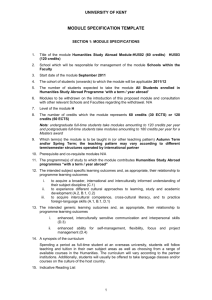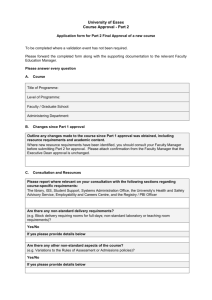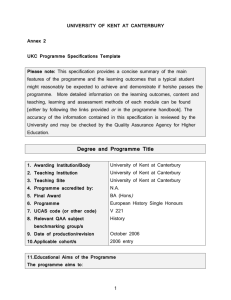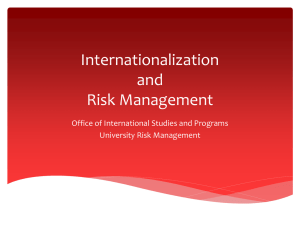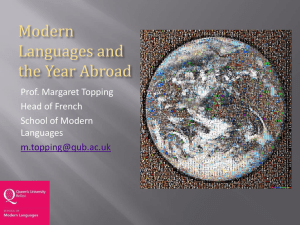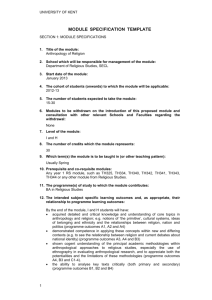University of Kent
advertisement
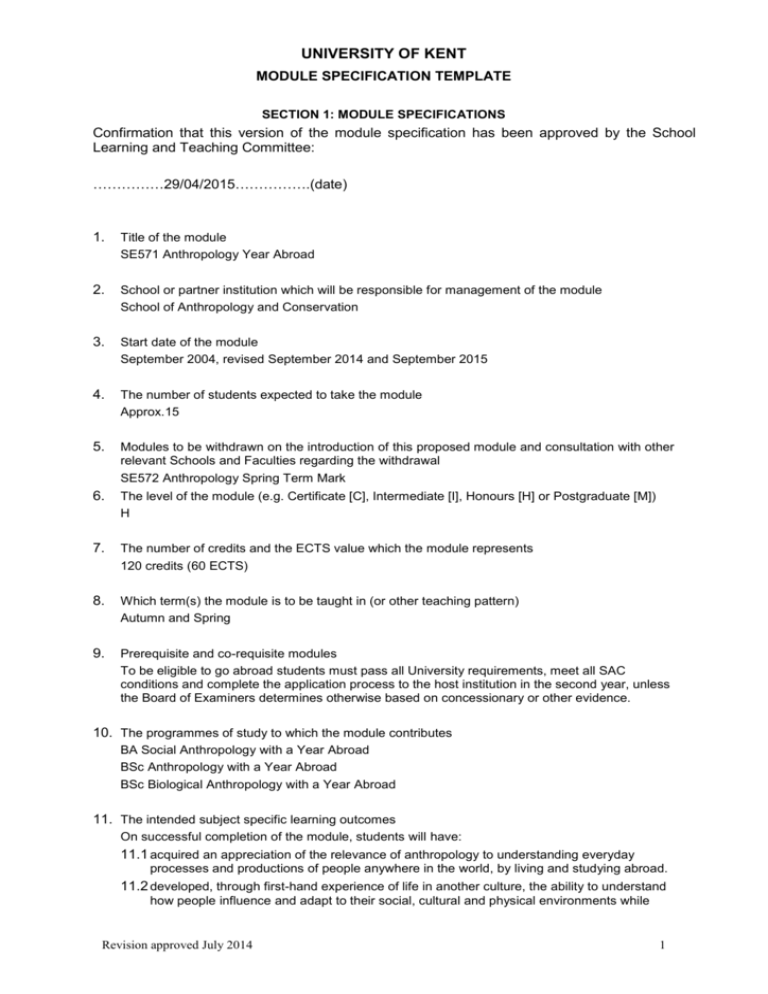
UNIVERSITY OF KENT MODULE SPECIFICATION TEMPLATE SECTION 1: MODULE SPECIFICATIONS Confirmation that this version of the module specification has been approved by the School Learning and Teaching Committee: ……………29/04/2015…………….(date) 1. Title of the module SE571 Anthropology Year Abroad 2. School or partner institution which will be responsible for management of the module School of Anthropology and Conservation 3. Start date of the module September 2004, revised September 2014 and September 2015 4. The number of students expected to take the module Approx.15 5. Modules to be withdrawn on the introduction of this proposed module and consultation with other relevant Schools and Faculties regarding the withdrawal SE572 Anthropology Spring Term Mark 6. The level of the module (e.g. Certificate [C], Intermediate [I], Honours [H] or Postgraduate [M]) H 7. The number of credits and the ECTS value which the module represents 120 credits (60 ECTS) 8. Which term(s) the module is to be taught in (or other teaching pattern) Autumn and Spring 9. Prerequisite and co-requisite modules To be eligible to go abroad students must pass all University requirements, meet all SAC conditions and complete the application process to the host institution in the second year, unless the Board of Examiners determines otherwise based on concessionary or other evidence. 10. The programmes of study to which the module contributes BA Social Anthropology with a Year Abroad BSc Anthropology with a Year Abroad BSc Biological Anthropology with a Year Abroad 11. The intended subject specific learning outcomes On successful completion of the module, students will have: 11.1 acquired an appreciation of the relevance of anthropology to understanding everyday processes and productions of people anywhere in the world, by living and studying abroad. 11.2 developed, through first-hand experience of life in another culture, the ability to understand how people influence and adapt to their social, cultural and physical environments while Revision approved July 2014 1 UNIVERSITY OF KENT nonetheless possessing a capacity for individual agency which can allow them to transcend environmental constraints. 11.3 a systematic understanding of how social, cultural and/or biological diversity influences human relationships and organisation, in the context of living in another culture. 12. The intended generic learning outcomes On successful completion of the module, students will have: 12.1 enhanced, intercultural sensitive communication and interpersonal skills 12.2 enhanced ability for self-management, flexibility, focus and project management 12.3 augmented their employment skills through formal and informal learning in an international context. 13. A synopsis of the curriculum Students will spend one academic year studying in a University with whom Kent has agreements for such exchanges. The purpose of the Year Abroad is to give students an opportunity to further their anthropological experience by living in another culture, as well as studying in a new HE context. Students develop a learning agreement (i.e. list of modules to be taken) with the module convenor (Year Abroad Coordinator) before commencing the year abroad. Students are registered for this module during their Year Abroad. During the year abroad itself students will follow the modules in their learning agreements at their host universities, therefore the curriculum will vary for each student, depending on the host institution and modules chosen. All students are encouraged to take primarily anthropology modules, or closely related subjects but are allowed the equivalent of one ‘wild module’ per term, as well as one language module, if appropriate. 14. Indicative Reading List Readings will vary, depending on which modules students register for during the year abroad. 15. Learning and Teaching Methods, including the nature and number of contact hours and the total study hours which will be expected of students, and how these relate to achievement of the intended module learning outcomes Learning and teaching methods will vary depending on the host institution and the modules chosen. Inclusive of independent study this module will require a total of 1,200 hours of study. The different learning and teaching methods will collectively enable students to achieve learning outcomes 11.1-11.3 and 12.1-12.3 16. Assessment methods and how these relate to testing achievement of the intended module learning outcomes The assessment methods cover the learning outcomes; the assessment methods are set by the host institution and will vary depending on which institution and which modules are chosen. If students pass a module at the host institution they will be awarded the corresponding credits for that module. Kent will assess this module on a pass/fail basis, obtaining the equivalent of 120 Kent credits – as documented by the transcript issued by the host institution – being required to award a pass. 17. Implications for learning resources, including staff, library, IT and space There are no other resource implications, as students will conduct this module while abroad. 18. The School recognises and has embedded the expectations of current disability equality legislation, and supports students with a declared disability or special educational need in its teaching. Within this module we will make reasonable adjustments wherever necessary, including additional or substitute materials, teaching modes or assessment methods for students who have declared and discussed their learning support needs. Arrangements for students with declared disabilities will be made on an individual basis, in consultation with the University’s/Collaborative Partner’s (delete as applicable) disability/dyslexia support service, and specialist support will be provided where needed. Although all student ILP requirements may not Revision approved July 2014 2 UNIVERSITY OF KENT necessarily extend to all partner institutions, they will be taken into account by the module convenor when assessing relevant coursework. 19. Campus(es) where module will be delivered: Not applicable If the module is part of a programme in a Partner College or Validated Institution, please complete the following: 20. Partner College/Validated Institution: 21. University School responsible for the programme: Revision approved July 2014 3 UNIVERSITY OF KENT SECTION 2: MODULE IS PART OF A PROGRAMME OF STUDY IN A UNIVERSITY SCHOOL Statement by the School Director of Learning and Teaching/School Director of Graduate Studies (as appropriate): "I confirm I have been consulted on the above module proposal and have given advice on the correct procedures and required content of module proposals" .........06/05/2015........................... Date ............................................... Director of Learning and Teaching Tatyana Humle ………………………………………………… Print Name Statement by the Head of School: "I confirm that the School has approved the introduction of the module and, where the module is proposed by School staff, will be responsible for its resourcing" ...5/5/15..................... Date Head of School……João de Pina-Cabral………. Print Name SECTION 3: MODULE IS PART OF A PROGRAMME IN A PARTNER COLLEGE OR VALIDATED INSTITUTION (Where the module is proposed by a Partner College/Validated Institution) Statement by the Nominated Officer of the College/Validated Institution (delete as applicable): "I confirm that the College/Validated Institution (delete as applicable) has approved the introduction of the module and will be responsible for its resourcing" ................................................................. .............................................. Nominated Responsible Officer of Partner College/Validated Institution Date …………………………………………………. Print Name ………………………………………………….. Post Revision approved July 2014 4 UNIVERSITY OF KENT …………………………………………. Partner College/Validated Institution Module Specification Template Last updated February 2013 Revision approved July 2014 5
